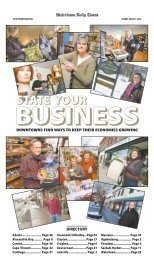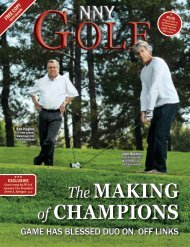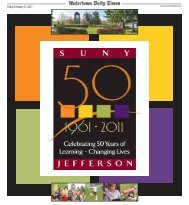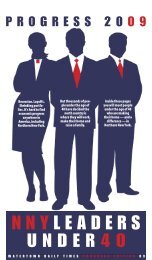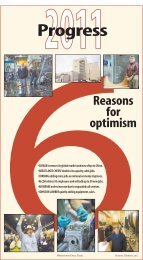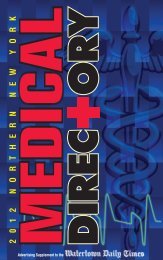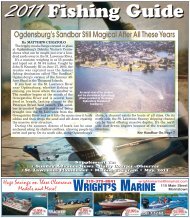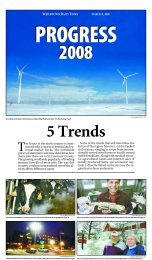Thursday, September 22, 2011 - Watertown Daily Times
Thursday, September 22, 2011 - Watertown Daily Times
Thursday, September 22, 2011 - Watertown Daily Times
You also want an ePaper? Increase the reach of your titles
YUMPU automatically turns print PDFs into web optimized ePapers that Google loves.
C M Y KE8 <strong>Thursday</strong>, <strong>September</strong> <strong>22</strong>, <strong>2011</strong>From E3pany fell to his wife, Stephanie.Mr. Cole took over as businessmanager.“It was in January 1905 thatI associated myself personallywith the daily routine work ofThe <strong>Times</strong>,” Mrs. Brockwaywrote 33 years later to HaroldJohnson. “My duties in thebusiness office were never verystrenuous. My love for, and interestin, the paper grew andstrengthened with the yearsuntil nearly everything elsewas secondary, and it was witha wrench that I finally severedmy connection with its activities”in 1931.Mrs. Brockway’s early yearsin the administration weremarked by a printers’ strike in1905, and by fierce competitionfrom another evening daily, the<strong>Watertown</strong> Standard. She overcameboth.“She was a stubborn fighter,”the <strong>Times</strong> said when she died in1941, but “she remained placidand serene no matter how tightmoney was or how difficult thefight.”When Mrs. Brockway retiredin California, she sold hercontrolling interest to HaroldJohnson. Three Brockways hadbuilt the newspaper, but it wasstill a small daily, having a circulationof 5,000. Mr. Johnsonwould make the <strong>Times</strong> the largestpaper north of Syracuse andAlbany.•••The son of Somerville merchantand postmaster JohnBrayton Johnson, Harold wasborn Aug. 9, 1880. Before thefamily’s move to Gouverneur,he became acquainted withthe problems facing farmers,problems his newspaper wouldstrive to solve, through hisgrandfather’s experiences.His grandfather, John Johnson,purchased land east ofSomerville in 1830, and clearedthe land for farming. Thestory was retold by Philip B.McDonald in “The Developmentof a Great Newspaper.”“A final payment was due onthe land before the family feltthat they owned it .... The familyhad raised eight head ofyearling and two-year cattle todrive the 12 miles for paymentto the holder of the mortgageat Richville, Civil War hero Col.Abel Goddard. The heifers hadbeen driven as far as the bridgeacross the Oswegatchie Riverat Gouverneur. ... It was justnoon. The big steam whistle ofthe Starbuck & McCarthy sawmillboomed into the quiet airof the village. The frightenedcattle had never heard such anawesome noise. They stampededwildly and plunged intothe river and were carried overthe swirling rapids below thebridge.”During his boyhood, HaroldJohnson and his friend, EdwardJohn Noble, worked for a farmerat 5 cents an hour weedingvegetables and picking berries.His friend would become a millionaireand philanthropist.At 16, Harold went to workfor a weekly paper, the GouverneurTribune. A short timelater, he founded a studentnewspaper, Echo, at GouverneurHigh School, and becamea correspondent for the <strong>Watertown</strong><strong>Times</strong> during summers.“Here, he enriched hisknowledge of north countypeople by meeting and befriendingmany JeffersonCounty residents summeringat the resort,“ wrote CharlesE. Fitzgibbon in his 1955 master’sthesis, “Voice of the NorthWATERTOWN DAILY TIMESHarold Johnson turned a small daily into a voice for the north country...During the 1940s World War II was the daily story for HaroldJohnson, whose son, John, was in Army intelligence.Country: The 100-Year Historyof the <strong>Watertown</strong> <strong>Daily</strong> <strong>Times</strong>in Northern New York Journalism(1850-1949).”Mr. Johnson set out for theWest in 1900, as a reporter fornewspapers in Portland, Ore.,and Helena, Mont. He becamehomesick and after about ayear returned to Gouverneur,where he wrote for the GouverneurFree Press and the NorthernTribune. Leasing the latter,he said in a 1944 speech “I wasnot only the editor of the paper,but I was the business managerand the handyman around theshop.”He was in his third year ofoperating it when he took Mr.Allen’s June 1904 telephonecall.“When I assumed the positionas city editor,” wrote Mr.Allen, “I asked Harold B. Johnsonto come to <strong>Watertown</strong> fromGouverneur and act as my assistant,which he did.”He accepted the <strong>Times</strong>’ jobfor $14 a week. Three yearslater, Mr. Johnson became thecity editor.Mr. Johnson’s upward climbcontinued in 1911, when hepurchased stock in the BrockwayCompany. A short timelater he was appointed vicepresident of the corporation,and in 1918, he was elevatedto managing editor. With thedeath of Mr. McKinstry in 1919,he became editor of the paperand president of the BrockwayCompany.The publisher at the timewas Charles H. Congdon, whohad come to the <strong>Times</strong> in 1908as business manager. Upon hisdeath in 1933, Mr. Johnson succeededas publisher.Lee Fuller was the first offour city editors to serve underMr. Johnson. Mr. Fuller wassucceeded in <strong>Watertown</strong> byHoward W. Palmer.“When I worked on the<strong>Times</strong>,” Mr. Palmer said in a1979 interview, “we did everythingwe could to get thescoops to the reader. ...Whilethe <strong>Times</strong> does a tremendousjob in reporting the local news,Montague InnCongratulations on 150 Years!482 Black River Parkway • <strong>Watertown</strong>, NY(315) 782-1777 • www.tlsnny.comon Tug HillLocated on Sears Pond Rd, Just off Rt. 177 • 376-2078Open Wednesday – Saturday 11:00 am daily, Sundays Noon ‘til 6~ Check Out Our New Dinner Menu ~Serving <strong>Daily</strong> lunches and dinners Thurs. 5-8, Fri. & Sat. 5-9WEDNESDAY NIGHT – Wing Night14 UNIT MOTEL OPEN YEAR ROUND.Please visitus on FacebookYOUR HOSTS:RICK & SUE LUCASATMon premisesHappy 150 th Anniversary!from19079 Route 11S (Washington Street) <strong>Watertown</strong>315-788-8412 • 1-800-464-8412www.rentawreck.comandWIDRICK AUTOSALESOuter Washington St. • <strong>Watertown</strong>, NY(315) 788-1913www.widrickautosales.commany papers do not.”Harry F. Landon took over in1924 when Mr. Palmer becameassistant secretary of the NewYork State Public Service Commission.Before he came towork for the <strong>Times</strong>, Mr. Landonwas hired to serve as secretaryto Rep. Thadeus C. Sweet.While working for Rep. Sweet,Mr. Landon wrote several storiesfor the <strong>Times</strong> from Washington- minus a byline.An office boy personally “recruited”by Mr. Johnson in 1916rose through the ranks from reporterto sports editor, state editorand then assistant city editorto succeed Mr. Landon in1932. Gordon W. Bryant wouldserve as city editor for 24 years.Several reporters gainedprominence under Mr. Johnson.Jay A. Moore, a policereporter and the <strong>Times</strong>’ firstsports editor, was consideredthe newspaper’s “star reporter”when he was killed in an autoaccident in 1919.The scope of local news coverageexpanded with the birthof bureaus and “stringers,” thelatter usually being womenworking part-time to reporthappenings in their villages.Frederick H. Kimball, a Carthagereporter in 1930, wouldadvance to city editor 26 yearslater. A reporter hired in 1941.Frank P. Augustine, eventuallybecame news editor.John C. (Jack) Case, hiredin 1920, became the longtime<strong>Watertown</strong> sports editor whowas credited with nicknamingchampion fighter Sugar RayRobinson.Clarence J. Webster, formerlyof Gouverneur, worked forMr. Johnson as a reporter andcopy editor from 1933 to 1947.“This was a good time at the<strong>Times</strong>,” Mr. Webster wrote.“Harold B. Johnson was at theheight of his long distinguishedcareer as the editor/owner ofthe newspaper and the radioand television stations, andas a leader and spokesman forthe north country. Mr. Johnsonwas a man of unusual ability asa newspaper maker. He was alwayskind and thoughtful withthose who worked for and withhim.”Mr. Johnson brought theBrockway Company into radiobroadcasting in April 1941,when he instituted radio stationWWNY, with a studio inthe Hotel Woodruff. Then, inOctober 1945, he added WMSAradio in Massena. He added FMstations at each studio in 1948.•••“As a newspaper publisher,Harold Johnson was no trimmerof sails,” Roy E. Fairmanwrote in the Syracuse Herald-American in 1949.“His editorial policies werenever determined by expediencybut by whether the subjectunder discussion wasbeneficial or inimical to publicwelfare. Verbally and with trenchantpen he fought for whathe believed to be right, againstwhat he believed to be wrong.”In 1916, he counseled oneof his reporters, FrederickW. Dove, a veteran who hadgrown cautious after beingsued for libel, according to aCanton Commercial Advertisercolumn. Mr. Dove’s fearshad started to affect other staffmembers.“Be sure of your facts,” Mr.Johnson agreed, but he added,“Don’t allow the fear of libelsuits to spoil your work. ... Ifyou do a good job of reporting,you will never be troubledwith a suit for libel, but if youget jittery about what’s going tohappen you will not be able towrite a good story and you willfrighten those about you.”Mr. Johnson disliked theterm “crusader,” but he championedmany causes for hisreaders.He was the nation’s leadingadvocate of a St. LawrenceSeaway, citing its potential forcheaper electricity and economicgrowth for communitiesalong the river system.Still in operation today onMarble Street is a city-ownedpower plant erected between1924 and 1927. Harold Johnson,wrote Marquis Childs inWashington, “waged a vigorous,unclinching campaign fora municipally owned powerplant for <strong>Watertown</strong>,” and inwinning, he earned “the enmityof powerful private utilityinterests.”His editorials “played a leadingpart in creating sentimentwhich resulted in federal-statecontrol of the metropolitanmilk market and adjusting milkprices so that the dairy farmerreceived a larger share of theconsumer’s dollar,” Roy Fairmansaid.He fought for better pay forschool teachers, almost asfirmly as he fought politicalbosses, whether they be Democratsor of his persuasion, theRepublican Party.”“One of thefirst questions asked in Albanyby political chiefs and theirhenchmen in regard to any issuewas “What does HaroldJohnson say about it?’,” Mr.Fairman wrote.Mr. Johnson served as thirdward supervisor in 1912 and1913, and on the <strong>Watertown</strong>Board of Education, of whichhe was president from 19<strong>22</strong> to1926. He was a lay minister, thefirst president of the New YorkState Newspaper Editors Association,a trustee or directorof banks, the Flower MemorialLibrary, the state dormitory authorityand St. Lawrence University.On May 17, 1949, Harold B.Johnson, 69, died of a heart attackat his summer home, “Underbluff,”Henderson Harbor.He left an estate of nearly a halfmilliondollars, and a newspaperthat had grown in circulationto more than 40,000.“Not many American citiescan boast a daily newspaperthat has a larger circulationthan the official population ofthe city,” wrote Mr. McDonald.“This means that the <strong>Times</strong>is widely read throughout thebroad surrounding region.The person most responsiblefor this was Harold Johnson.He worked unceasingly duringthe greater part of his life to improvethe <strong>Times</strong> in every way,and to advance its influence.“His untimely death was asincere shock to thousandsof readers who felt that theyknew the editor and publisherpersonally. As a matter of fact,many of them did.”




